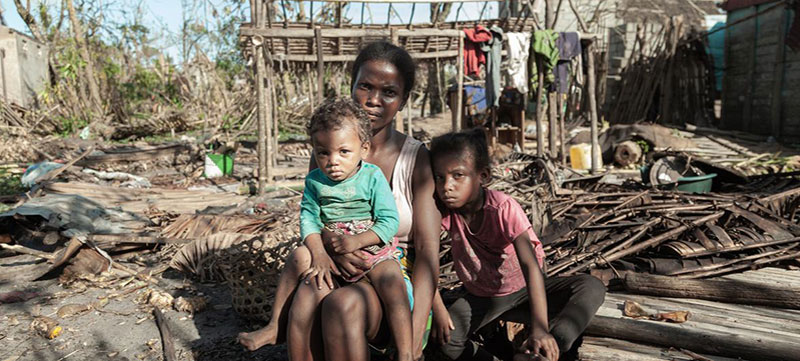 ClimateAction
ClimateAction New York: The impact of extreme weather on Madagascar is an example of the “runaway humanitarian needs” the world will face, unless it takes action to tackle the climate crisis, the World Food Programme (WFP) said on Friday.
The warning comes after tropical cyclone Emnati made landfall on Wednesday in one of Africa’s most storm-prone countries and just days ahead of the launch of a report by the Intergovernmental Panel on Climate Change (IPCC).
Four storms in one month
Cyclone Emnati is the fourth tropical storm to hit Madagascar in one month. Reports indicate that the storms – Emnati, Dumako, Batsirai and Ana – “have wrecked the island nation, causing widespread damage to agricultural land, including the rice crop that was just weeks away from harvest,” said WFP.
Cash crops like cloves, coffee and pepper have also been severely affected.
According to the UN food agency, WFP, an estimated 90 per cent of crops could be destroyed in some affected areas – particularly worrisome in a country where the majority of people make a living from agriculture.
‘Bound to deepen hunger’
Crashing into vulnerable communities that are already at breaking point, the cyclone is “bound to deepen hunger”, including in southern Madagascar, which has been reeling from years of severe drought – another manifestation of the country’s vulnerability to climate extremes, according to WFP.
Given how dry the land is in these areas, concerns are rising over the risk of flash floods.
“What we are seeing in Madagascar is extreme climate impacts, a series of storms and prolonged drought affecting hundreds of thousands of people,” said Brian Lander, WFP’s Deputy Director of Emergencies.
Last December, there were already 1.64 million people who were food insecure and in need of humanitarian assistance throughout the country.
The back-to-back storms have also impacted market supplies with the potential to send food prices soaring and food insecurity spiralling in the coming months.
Forecasts predict another tropical system already forming in the south-west Indian ocean.
Need to adapt to new reality
“While WFP is providing essential food in the aftermath of the storms, we need to be equally fast in thinking about how these communities are going to adapt to this new reality,” Mr. Lander continued.
Although food and cash assistance are being delivered to alleviate the impacts of recent storms, as well as IT and logistics support, WFP reiterated the importance of longer-term climate adaptation to help communities prepare for, respond to, and recover from climate shocks and stresses.
For example, WFP’s integrated risk management in the districts of Ambovombe and Amboasary last year reached 3,500 smallholder farmers with insurance, savings, and climate-adapted agriculture practices training.
Managing responses, long-term
The UN agency is calling for long-term response programmes to be scaled up, especially for communities on the frontlines of the climate crisis.
The WFP’s Country Strategic Plan in Madagascar aims to promote an integrated, shock-responsive social protection system for ensuring that vulnerable populations have access to nutritious food before, during and after crises.
Triggering global hunger
Meanwhile, the climate crisis continues to drive global hunger worldwide.
In 2020, extreme weather contributed to most of the world’s food crises and was the primary cause of acute food insecurity in 15 countries, WFP concluded.
Recent reports pointed to an estimated 13 million people waking up severely hungry every day in the Horn of Africa, as the region grapples with a major drought caused by the driest conditions since 1981.
Support Our Journalism
We cannot do without you.. your contribution supports unbiased journalism
IBNS is not driven by any ism- not wokeism, not racism, not skewed secularism, not hyper right-wing or left liberal ideals, nor by any hardline religious beliefs or hyper nationalism. We want to serve you good old objective news, as they are. We do not judge or preach. We let people decide for themselves. We only try to present factual and well-sourced news.







